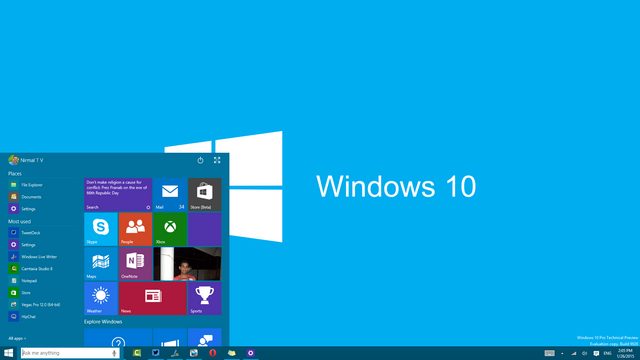Microsoft has released a new cumulative update KB4012606 Build 10240.17319 for Windows 10 RTM users. You will see a new Cumulative Update for Windows 10 based Systems (KB4012606) in you updates. Previously, the company released update build 10240.17236.
Fixed in Windows 10 Update KB4012606 Build 10240.17319
- Addressed known issue called out in KB3210720. Users may experience delays while running 3D rendering apps with multiple monitors.
- Addressed issue where the Active Directory Administrative Center (ADAC) crashes when attempting to modify any attribute of any user account in Active Directory.
- Improved the reliability of .NET and Internet Explorer.
- Addressed issue that fails to launch a Help browser window when you click the Help icon in File Explorer.
- Addressed issue to allow wildcards in the Allowed list field for the Point and Print Restrictions Group Policy.
- Addressed issue that reduces performance because excessive multicast Domain Name System packets are created whenever new devices are searched for, added, or removed.
- Addressed issue that prevents clients from accessing a file server when using Server Message Block 1.0 and NT LAN Manager authentication after an upgrade.
- Addressed issue that causes text to disappear when you resize an Internet Explorer window after changing the encoding to Hebrew.
- Addressed issue that occurs in Internet Explorer when the CSS float style is set to “center” in a webpage.
- Addressed issue that may cause an app or webpage to become unresponsive or sluggish if it uses the web browser functionality of Internet Explorer 11.
- Addressed issue that causes Internet Explorer to fail after removing a CSS style.
- Addressed issue that causes Internet Explorer to fail after installing KB3175443.
- Addressed issue where a list in a combo box fails to update based on the selected item in another combo box.
- Addressed issue that occurs when copying a file that has Encrypting File System (EFS) encryption to a share that is not encrypted by EFS.
- Addressed issue that causes the Start menu and other items to disappear or malfunction when using roaming user profiles.
- Addressed issue that causes excessive audit log events when using the Audit File System category.
- Addressed issue where devices go into BitLocker recovery if users enter the wrong password.
- Addressed issue that prevents a smart card module from pairing with a contactless smart card reader.
- Addressed issue that causes high CPU usage for scheduled tasks when using devices whose daylight saving time occurs at 12 A.M.
- Addressed issue that fails to apply the Group Policy setting value of “Unrestricted” for the media connection cost.
- Addressed issue that prevents administrators from accessing mapped network drives.
- Addressed issue that causes print preview to fail in Internet Explorer.
- Addressed issue in which locally installed fonts are not used when Font Download is disabled in Internet Explorer.
- Addressed issue that causes incorrect table dimensions in SAP® applications.
- Addressed issue that prevents a webpage from loading after logging in to a site.
- Addressed issue where a text box doesn’t allow the user to type the maximum number of allowed characters when using the Japanese Input Method Editor in Internet Explorer.
- Addressed issue that loads websites that bypass the proxy server in the local intranet zone when the Intranet Sites: Include all sites that bypass the proxy server (Disabled) is set.
- Addressed issue that prevents Internet Explorer from receiving keyboard events from external processes using addEventListener.
- Addressed issue that overwrites a <br> element when users select a line that is enclosed by a <span> element.
- Addressed issue that allows files that are forbidden by the security zone setting to be opened in Internet Explorer.
- Addressed issue where using registry exclusions with Unified Write Filter (UWF) enabled increases the system boot time substantially.
- Addressed additional issues with updated time-zone information, Windows Shell, enterprise security, Internet Explorer, and updates to the Access Point Name (APN) database.
- Security updates to the Windows OS, Windows kernel-mode drivers, Microsoft Uniscribe, Windows Hyper-V, Microsoft Graphics Component, Internet Information Services, Server Message Block, Internet Explorer, Microsoft Edge, Windows Media Player, SHA-1 deprecation for SSL/TLS certificates, Microsoft XML Core Services, and the Windows kernel.

